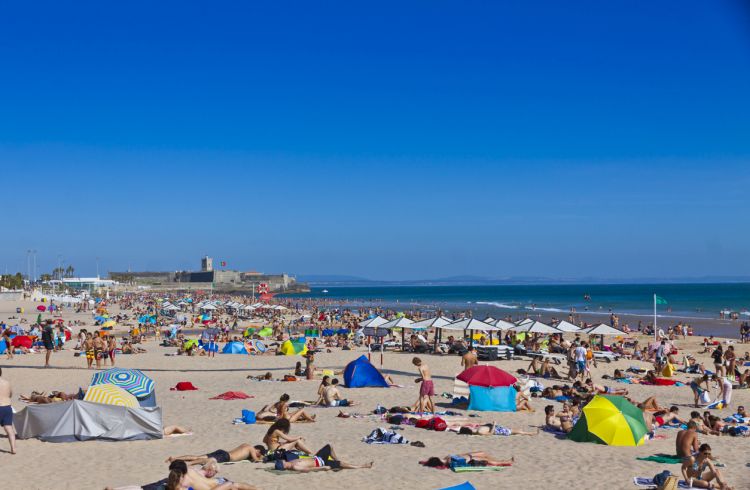How to Stay Healthy and Safe on Portugal's Beaches
Thousands of people visit Portugal's beaches every year, but there are a few safety concerns to keep in mind before you go swimming. Here's how to enjoy Portugal's coast safely.
 Photo © Getty Images/katatonia82
Photo © Getty Images/katatonia82
Portugal has some of the best beaches in Europe. With more than 1,056 miles (1,700km) of coastline, it's the perfect place to travel for sunshine, swimming, surfing or simply exploring coastal towns.
But before you travel to Portugal's coast, you should be aware of the possible dangers and what to avoid to ensure your visit is a safe one.
- Is it safe to swim at Portugal's beaches?
- Understand lifesaver beach flags in Portugal
- Portugal's west coast
- Swimming pool safety
Is it safe to swim at Portugal's beaches?
Given Portugal's long coastline, the risk of drowning is a possibility, and each year there are deaths in the beautiful waters off Portugal.
One of the biggest causes of beach drowning is a rip, a dangerous current that cycles water back into the ocean and often pulls unsuspecting swimmers along with it. Rips are particularly dangerous because they can't be seen and are extremely strong.
Beware of uncrowded areas and those that are designated as surf zones, as they more likely to conceal hazardous currents.
Parents should be especially cautious when allowing their children to swim. In 2007, four tourists drowned off the Algarve coast while trying to save three children from strong currents.
If you find yourself caught in a rip, don't panic. Frantically battling the current will quickly exhaust you, prevent you from thinking clearly and subsequently increase the risk of drowning. Draw attention to yourself by waving and calling for help. Stay calm, float and go with the flow until the rip's pull weakens, and then try to slowly swim parallel to the shore away from the rip, aiming for the breaking waves.
Some areas hide dangerously shallow water and rocks. If you are going to dive in, be sure it's in an area that you know is deep enough.
Lifesaver flags and warnings in Portugal
Avoid swimming in areas where there are no lifeguards. You should also exercise caution when swimming at beaches that connect to rivers as the streams and currents can be more hazardous.
On the beaches where there are lifeguards, there are typically flags placed to indicate the level of danger to swimmers. It's important to know what these warning flags mean and to adhere to them.
- Green flag = Safe to swim
- Yellow flag = You may remain at the water's edge, but no swimming
- Red flag = Danger, no swimming
- Checkered flag = Beach is temporarily unmanned
- Blue and purple flags = Dangerous marine life has been spotted e.g jellyfish, stingrays, sea snakes, sharks
Keep in mind that if you ignore any of the warning flags there are consequences (besides the obvious safety ones) – the Maritime Police frequently issue fines to those not adhering to a lifeguard's warnings.
It's also important to note that after September, the swimming season in Portugal is considered closed, so although the weather may still be mild and beaches inviting, there are no lifeguards on duty and no safety flags will be displayed, regardless of conditions.
Check with the locals about when and where is safe to swim or surf, and be extra vigilant when in the water.
Portugal's west coast
The water on Portugal's west coast tends to be more hazardous due to the powerful Atlantic Ocean. Surfers and wind-surfers like this coast for its conditions and near-perfect waves, but obviously the wilder water presents a greater risk. Extra caution should be used if you plan on swimming or participating in water sports on the west coast.
Swimming pool safety
Many hotels and holiday rental homes have swimming pools, and in the popular Algarve region of southern Portugal, the majority of drowning deaths occur in pools.
There are currently no regulations in place in Portugal for private swimming pools to have safety measures including fences, covers or alarms (including hotel pools). Just because a pool may appear safer and more serene than the ocean, it doesn't mean it is. Always make sure children are supervised in the pool and that they don't have access to it when no one else is around which might include locking villa or apartment doors to stop children leaving without an adult.
Never swim while or after drinking alcohol.
Related articles
Simple and flexible travel insurance
You can buy at home or while traveling, and claim online from anywhere in the world. With 150+ adventure activities covered and 24/7 emergency assistance.
Get a quote

No Comments